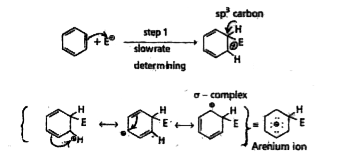Explain aromatic electroplhilic substitution reactions of benzene.Solution in Telugu
(1) Halogenation : Benzene reacts with bromine or chlorine in the presence of Lewis acids like FeCl2,AlCl3 et. , to give corresponding halobenzene.

Similarly with bromine, bromobenzene is formed.
(2) Nitration: Benzene undergoes nitrogoes nitration when hated with a mixture of 1:1 (by vulume) concentrated nitric acid, and concentrated sulphuric acid (nitration mixiture) at a temperature below 60∘C.

(3) Berizene reacts with fuming sulphuric acid (oleum) and gives benzene sulphonic acid.

(4) Friedel - Craft.s alkylation and acylation : Benzene reacts with alkyl halides and acyl h in the presence of Lewis acids (AlCl3,FeCl3) and gives alkyl benzenes and acyl benzenes.

Benzene reacts with acetyl chloride in te presence of anhydrous aluminium chloride and acetophenone.

General Mechanisms : Electrophilic substitution reaction (s) proceeds in two steps as
l. Generation of electrophile
II. a) Formation of carbocation intermediate
b) Removal of proton from carbocation intermediate. . "
l. Generation of electrophiteE+: In the reactions halogenation, alkylation and acylatio benzene anhydrous AlCl3 the Lewis.acid produces electrophile X+ say Cl+,R+andRCO+ by reacting the reagent chlorine, alkyl halide and acylhalide respectively.

ll a) Formation of carbocation : Electrophile generated above attacks one of the benz carbons to change it to sp3 hydridised. The carbocation (Arrhenium ion) is stabilised through resonal.

Sigma complec loses aromatic character due to delocalisation of electrons stopping at sp3 carbon
b) Losing of proton : To regain, aromatic character the +C loses one proton to sp3 carbon on attacked of (AlCl4) in case of halogenation , alklation and acylation and HSO−4 in case of nitration .
Topper's Solved these Questions
- ORGANIC CHEMISTRY SOME BASIC PRINCIPLES AND TECHNIQUES BOOK - VIKRAM PUBLICATION ( ANDHRA PUBLICATION)CHAPTER - ORGANIC CHEMISTRY SOME BASIC PRINCIPLES AND TECHNIQUES EXERCISE - IMPORTANT QUESTIONS
42 Videos
- ORGANIC CHEMISTRY SOME BASIC PRINCIPLES AND TECHNIQUES BOOK - VIKRAM PUBLICATION ( ANDHRA PUBLICATION)CHAPTER - ORGANIC CHEMISTRY SOME BASIC PRINCIPLES AND TECHNIQUES EXERCISE - SHORY ANSWER QUESTIONS
15 Videos
- MARCH - 2016 (TELANGANA)BOOK - VIKRAM PUBLICATION ( ANDHRA PUBLICATION)CHAPTER - MARCH - 2016 (TELANGANA)EXERCISE - SECTION C
3 Videos
- STATES OF MATTER GASES AND LIQUIDS BOOK - VIKRAM PUBLICATION ( ANDHRA PUBLICATION)CHAPTER - STATES OF MATTER GASES AND LIQUIDS EXERCISE - LONG ANSWER QUESTIONS
22 Videos
Similar Questions
Write the regents required for conversion of benzene to methyl benzene.
View SolutionComplete the following reactions and name the products A,B and C.
CaC2H2O−−→Ahot metal tube−−−−−−−−→BAlCl3+CH3Cl−−−−−−−−→C
View SolutionWhat are the postulates of Bohr's model of hydrogen atom?
View SolutionWrite notes on Intermolecular forces
View SolutionAromatic Nucleophilic Substitution Reaction
View SolutionFind out the number of reactions that are electrophilic aromatic substitution aromatic substitution in nature.
View SolutionFor an electrophilic aromatic substitution reaction
View SolutionExplain electrophilic substitution reactions of chloro benzene .
View SolutionExplain Ring substitution reactions of aromatic carboxylic acids.
View Solutionबेंजीन की नाइट्रीकरण इलेक्ट्रोफिलिक प्रतिस्थापन अभिक्रिया समझाइए ?
View Solutionबेंजीन की हेलोजेनीकरण इलेक्ट्रोफिलिक प्रतिस्थापन अभिक्रिया समझाइए ?
View SolutionWhat is substitution reaction? Explain any two substitution reaction of benzene.
View SolutionExplain aromatic electroplhilic substitution reactions of benzene.
View SolutionExplain the aromatic electrophilic substitution reactions of anisole with equations. Aromatic electrophilic substitution reactions:
View SolutionFor an electrophilic aromatic substitution reaction :
View SolutionDescribe the aromatic electrophilic substitution action of benzene.
View Solution